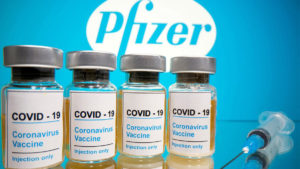 “We are operating at the speed of science.”, Albert Bourla stated when sharing news about the Pfizer’s vaccine in manufacturing sites in Texas. With the need of these vaccinations, some testing sites in Texas tried to speed up the process and distribute as many products as they could—leading them to go against data integrity and not completing a full research inspection. These manufacturing sites employed untrained vaccinators and was slow to show any results leading up to phase III trial.
“We are operating at the speed of science.”, Albert Bourla stated when sharing news about the Pfizer’s vaccine in manufacturing sites in Texas. With the need of these vaccinations, some testing sites in Texas tried to speed up the process and distribute as many products as they could—leading them to go against data integrity and not completing a full research inspection. These manufacturing sites employed untrained vaccinators and was slow to show any results leading up to phase III trial.
A former regional director at the Ventavia Research Group made a statement about the employees not following research requirements, making up data information and not blinding the patients for trials. Reports were not easy to access, it took a while for this manufacturing company to show reports when asked—meaning, data had to be created before showing reports. The regional director at Ventavia constantly notified the company about the issues they were having in the lab, but she was ignored. She was then fired from Ventavia after she contacted the FDA to help fix the issues.
The regional director from Vantavia knew how important data integrity was. With InQuest Science’s Identifier software, data is secure and easy to import product inspection results or defect control information required by USP-790/1790 while following all current guidelines for data integrity. Data is stored, tracked and traced all within one system. Reports are easy to access and printable. This shows proof of all data imported and deleted, who double checked the data and qualifications needed for the specific product. Testing and Training is blinded to provide accurate results. This software is versatile and could be used for many data storage options.
InQuest Science can help reduce issues with data and qualification integrity, quality assurance and tracking product information.
Read the full article published by Paul D Thacker of The BMJ for more info.

